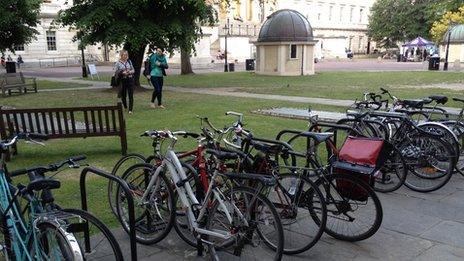Poor pupils with good grades 'miss top universities'
- Published

Some working-class pupils with good grades may be avoiding elite institutions in favour of less selective universities, suggests research
Richer teenagers are three times more likely to go to top universities than working class pupils, even if they have the same grades, research suggests.
Researchers compared the proportion of teenagers in England with good grades with figures for those with places at "high status" institutions.
The gap between the groups is not simply due to grades, they conclude.
"We need to talk about other possible causes," said Dr John Jerrim of London University's Institute of Education.
'Access gap'
The researchers also looked at the extent of the access gap between the social classes to elite universities in Australia and the United States.
"Although academic achievement is an important factor, a substantial proportion of the elite university access gap in each country remains unexplained.
"This suggests that there are working-class children whom, even though they have the grades to attend, choose to enter a non-selective institution instead," said Dr Jerrim, who led the research.
The study suggests that children of professionals in England are 3.2 times more likely to go to a Russell Group university than working-class children.
But the study found that the gap was not just down to poorer grades among working-class pupils.
Once the researchers had taken pupils' exam achievements into account, they found that teenagers with good grades from professional families were 1.4 times more likely to go to one of these universities than working-class pupils with similar grades.
The research suggests the access gap is in fact less pronounced in England than in the United States and Australia.
In Australia, children of professionals are 2.7 times more likely to attend a highly selective university than their working-class peers but only half of this difference is explicable by high school grades, say the researchers.
International comparisons
In the United States entry to elite private universities is dominated by students from professional backgrounds who are more than six times more likely to attend than those from working-class families.
The researchers say less than half (48%) of the difference is explained by high grades.
The figures for leading US public universities show wealthier students are 3.3 times more likely to attend, with around 40% of the difference explicable by grades, says the study.
The paper will be presented to a summit on university access organised by the education charity Sutton Trust.
Dr Jerrim will also tell the summit about differences in student funding in the three countries.
Bursaries for low and middle-income students at Harvard, for example, can allow them to graduate "debt free", despite fees of more than £37,000 a year, he will say.
Dr Wendy Piatt, director general of the Russell Group, said the report showed the main reason pupils from disadvantaged backgrounds were less likely to go to leading universities "is because they are not achieving the right grades" in the right subjects.
"It is also the case that some very bright students are not encouraged to apply for leading universities. We cannot offer places to those who do not apply or who have not done the right subjects to study their chosen course.
"Access is an issue for leading universities across the globe - there is no silver bullet to this entrenched problem."
Dr Piatt said the group was working hard to tackle the access gap, "pumping millions more into outreach programmes" and publishing advice to help students choose their A-levels.
Pam Tatlow, chief executive of the million+ group said: "The Sutton Trust wrongly assumes that the interests of well-qualified students are best served if they study at a small number of universities which label themselves as elite.
"Students are much more savvy than this. They understand that high-quality, top-class degrees leading to high-flying, professional careers are available at a wide range of universities. It is therefore unsurprising that they choose to study at these universities."
- Published8 October 2013
- Published8 August 2013
- Published2 August 2013
- Published9 May 2011